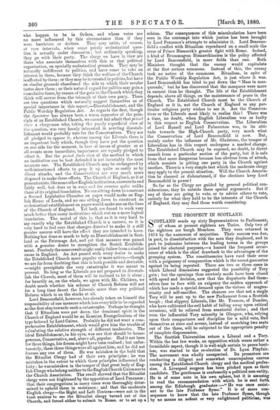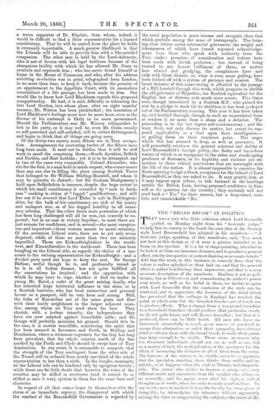THE PROSPECT IN SCOTLAND.
SCOTLAND sends up sixty Representatives to Parliament, of whom at present eighteen are Tories. Only two of the eighteen are burgh Members. They were returned in 1874 by the narrowest of majorities. Their success was due, in part, to dissatisfaction with the men they displaced, and in part to jealousies between the leading towns in the groups joined for electoral purposes,--a hazard the frequent occur- rence of which is the chief drawback to the advantages of the grouping system. The constituencies have rued their error with a poignancy of compunction which is the surest guarantee against its being repeated. There are two or three cases in which Liberal dissensions suggested the possibility of Tory gain ; but the openings thus unwisely made have been closed with speed and decision, now that the disputants find them- selves face to face with an exigency the sudden approach of which has made a special demand upon the virtues of magna- nimity and self-sacrifice. The chances are that not a single Tory will be sent up to the new Parliament from a Scottish burgh ; that slippery Liberals, like Mr. Yeaman, of Dundee, who have cultivated the evil habit of falling away upon critical occasions, will be relieved from senatorial duties ; and that even the influential Tory minority in Glasgow, who, relying upon their compactness and discipline for a solid vote, find themselves at sixes and sevens, instead of snatching two seats out of the three, will be subjected to the appropriate penalty of complete dispossession. The Scottish Universities return a Liberal and a Tory. Within the last few weeks, an opposition which wears rather a formidable aspect, though it is well-nigh certain to prove boot- less, was started to the re-election of Dr. Lyon Playfair. The movement was wholly unexpected. Its promoters are conducting a diligent and somewhat unscrupulous canvas among the Established-Church clergy and the medical profes- sion. A Liverpool surgeon has been pitched upon as their candidate. The gentleman is confessedly a political non-entity. He is of some note in his own sphere, but it is amusing to read the recommendation with which he is sent forth among the Edinburgh graduates :—" He was once assist- ant to the late Professor Byrne." It is of more con- sequence to know that the late Professor Byrne, though by no means an ardent or very enlightened politician, was
a warm supporter of Dr. Playfair, than whom, indeed, it woold be difficult to find a fitter representative for a learned constituency. That he will be ousted from the place he holds is extremely improbable. A much greater likelihood is that the Liberals will be able to provide him with a like-minded companion. The other seat is held by the Lord-Advocate, who is out of favour with his legal brethren because of the obsequious facility with which he has allowed Mr. Cross to overrule and supersede him ; who has never found himself at home in the House of Commons, and who, after his address soliciting re-election was in print, telegraphed from London, in no more than time, to keep it back, because the promise of an appointment to the Appellate Court, with its anomalous concomitant of a life peerage, has been made to him. One would like to know how Lord Blackburn regards this proposed companionship. He had, it is said, difficulty in tolerating the late Lord Gordon, into whose place, after an eight months' vacancy, Mr. Watson has been pitchforked ; the laceration of Lord Blackburn's feelings must now be more keen, even as the flavour of his contempt is likely to be more pronounced. Should the Parliamentary seat Mr. Watson relinquishes be lost to his party, as it may well be, even Mr. Cross, usually so self-possessed and self-satisfied, will be rather flabbergasted, and begin to think that all things are going awry.
Of the thirty-two county seats, fifteen are in Tory occupa- tion. Arrangements for contesting twelve of the fifteen have long been made. It need not be hidden that it will be stiff work to assail the remaining three,—South Ayrshire, Selkirk and Peebles, and East Lothian ; yet it is to be attempted, and in two of the cases very reasonably. Colonel Alexander, who sits for the first, is a man held in much respect, who comes nearer than any one else to filling the place among Scottish Tories that belonged to Sir William Stirling-Maxwell, and whom it may be quixotic to disturb ; but Sir Graham Montgomery's hold upon Selkirkshire is insecure, despite the large extent to which his small constituency is recruited by "men in buck- ram" ranking in virtue of " faggot " qualifications ; and still less can it be averred that Lord Elcho is safe in Haddington- shire, for the bulk of his constituency are sick of his jaunty and malapert airs, as of his dogged hostility to all neces- sary reforms. That the other dozen seats possession of which has been long challenged will all be won, can scarcely be ex- pected; but in no case is victory hopeless ; in most there are just reasons for confidence, and in several—the most conspicu- ous and important—those reasons mount to moral certainty. Of the seventeen Liberal seats, there are as yet only seven disputed, while of these no more than two are seriously imperilled. These are Kirkcudbrightshire in the south- west, and Kincardineshire in the north-east. There has been bungling on the Liberal side, as regards the choice of a suc- cessor to the retiring representative for Kirkcudbright ; and a divided party need not hope to keep the seat. Sir George Balfour, useful though he is, and profoundly versed as he is in all Indian finance, has not quite fulfilled all the expectations he inspired ; and the opposition with which he may have to cope, whether it find its leader in young Mr. Baird, a cadet of the great mining family, who has inherited large territorial influence in the shire, or in a Scottish barrister, who has local connection and personal favour as a passport, will be very keen and strong. Still, the folks of Kincardine are of the same grain and fibre with their hardy neighbours in the larger adjacent coun- ties, among whom no Tory need show his face. They cherish, with a jealous tenacity, the independence they have ere now asserted against formidable odds; and Sir George will probably maintain his ground. Should this be the case, it is nowise incredible, considering the spirit that has been aroused in Inverness and Perth, in Stirling and Dumbarton, where a strenuous eagerness for the fray has long been prevalent, that the whole country north of the line marked by the Forth and Clyde should be swept bare of Tory domination. In any event, it is reasonable to compute that the strength of the Tory contingent from the other side of the Tweed will be reduced from nearly one-third of the whole representation to less than a sixth. In the burghs, unanimity on the Liberal side can be hindered only by egregious fatuity ; while there can be little doubt that, however the voice of the counties may be stifled or overborne (and it cannot be so stifled as once it was), opinion in them has the same bent and character.
In respect of all that comes home to themselves with the stress of an immediate urgency, the disapproval with which the conduct of the Beaconsfield Government is regarded by the rural population is more intense and energetic than that which prevails among the mass of townspeople. The farm- ing class labour under substantial grievances, the weight and irksomeness of which have forced repeated acknowledge- ment from those who speak with authority from the Tory ranks ; promises of consideration and redress have been made with lavish profusion ; but instead of being treated to any honest fulfilment of them, no matter how stinted and grudging, the complainers have met only with blunt disdain, or, what is even more galling, have been fobbed off with a system of pretence and evasion. The latest instance of this manoeuvring is afforded by the passage of a Bill, hurried through this week, which purports to abolish the old grievance of Hypothec, the Scottish equivalent for the English law of distress, only much more severe. Five times over, though introduced by a Scottish M.P., who gained his seat by a pledge to work for its abolition, it has been jockeyed out of the Parliamentary running. This year it has been taken up, and hurried through, though in such an emasculated form as renders it no more than a sham and a delusion. The proceeding is to the last degree self-condemnatory ; and the wary Scots not only discern its motive, but resent its sup- posed applicability as a libel upon their intelligence,— so galling them on their touchiest point. The anger which this has aroused is deep, as well as pervasive. It will powerfully reinforce the general mistrust and dislike of Lord Beaconsfield's foreign policy, the flashy and hazardous nature of which is as repugnant to the sober and steady-going prudence of Scotsmen, as its duplicity and violence are ob- noxious to those ethical convictions that are inwrought with the life of the nation. It is almost impossible to conceive the Scots agreeing to sign a blank acceptance for the behoof of Lord Beaconsfield, as they are asked to do. It may gratify him, as it may impose upon others, to ride forward to the hustings astride the British Lion, having proposed confidence in him- self as the question for the country ; they certainly will not send back a "Yes" for their answer, but a deep-toned, reso- lute, and unmistakable "No."



































 Previous page
Previous page